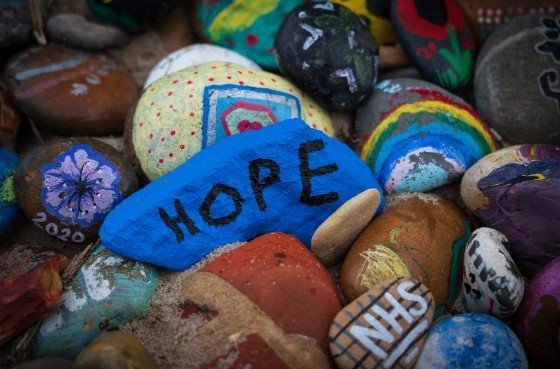Ron Mock: conflict, hope, and God's love for us
Conflict is a key part of God’s providential love for humanity. We are designed to conflict. Our different perspectives arise out of our different genetics and life experiences. Those differences are crucial resources in meeting human needs.
I received that bit of wisdom in an email from Ron Mock. I immediately decided to ask Ron to write up how he came to that view of conflict. Ron attends North Valley Friends and has a long history of being a mediator and thoughtful writer.
Impressed by the people I had already interviewed for this newsletter, he initially questioned my sanity in asking him to write for us. I maintain that it was one of my more lucid moments. See for yourself.
- Judy Maurer, editor
Over to Ron:
Here’s the deal: I’m a lawyer, who strayed off the attorney career path almost immediately. My first job after law school was as a prehearing attorney, a staff member to the Michigan Court of Appeals. I reviewed cases coming up on appeal.
One of those cases was a three-way conflict among sisters, arguing over the distribution of their dead father’s estate. The sisters had been litigating for years. Spite dripped from the pages of their file.
There had to be a better way, so I accepted an offer to help start a Christian Conciliation Service in the Detroit, Michigan area. Largely drawing on Paul’s rebuke to the Corinthians in I Corinthians 6: 1-7, CCS provided mediation as an alternative to going to court, hoping to resolve disputes and reconcile relationships.
The case of the three bitter sisters helped divert my path into mediation work. In 1985 I accepted an invitation from George Fox University in Newberg to join Lon Fendall in the then-new Center for Peace Learning. My job was to add an interpersonal and small-group conflict dimension to the Center’s teaching about peacemaking. When Lon left in January 1990, I took over directing the Center. In that role I helped start the Your Community Mediators program in Yamhill County, and led its mediation training every two years for two decades.
People come to mediators because they haven’t been able to resolve their disputes on their own. They often are in despair that their disputes can ever be resolved. Mediators have to bring hope. The mediation process itself is a reason to have hope, but some mediations go through stretches where even the mediators get discouraged. How could I help my mediators keep hoping when the mediation seems to be going nowhere?
In an interview for this newsletter, Julie Peyton describes her spiritual journey as coming alive when she abandoned a theology and let her experience draw her ultimately to Jesus. But I think for me it may have gone the other way: from theology to experience.
I tell my trainees that I ground my hope for each mediation in my faith in a loving, omnipotent God. This is a theological faith, expressed in a lawyer-friendly syllogism:
If God is omnipotent, then (at least) anything God wants is possible.
If God is loving, and loves all of us, then God must want all of us to (at least) have means to meet our needs.
Therefore, there always has to be a way for both sides in the bitterest mediation to find means to meet their needs.
Maybe not their wants, especially not their desires for revenge, but their needs are always within reach.
As some trainees point out, every day some people’s needs go unmet. Time runs out. Some ills we do not know how to cure. Are we asking the parties in the mediation to rely on miracles?
For decades my answer has been “you are asking good questions. I don’t have an easy answer. But I am telling you, for the sake of the people you are mediating with, you need to be the last person in the room to abandon hope. However you do it, you need to get there, or you will not be able to help them.”
It’s not a bad answer. But it is incomplete. I think I can improve on it now.
Photo by Robert Bye on Unsplash
I am a lawyer and a mediator. Both roles demand putting yourself in the shoes of those who disagree so you can understand their position from their point of view. One day I was trying to figure out how best to illustrate this idea to students in a dramatic way. What memorable example could I use? Who would be the hardest person to empathize with, and how could I show the advantages of understanding their point of view? Should I use Hitler? Stalin?
How about Satan? And the temptation of Jesus after he fasted for 40 days and nights (Matthew 4:1-11).
This was Satan’s big chance to derail God’s redemptive plan, maybe forever. Satan gets three shots at diverting Jesus’ ministry. These must be the very best temptations possible!
But when I looked at the temptation from Satan’s point of view, I got a shock.
The first temptation is to turn stones into bread. Why would THAT make Satan’s top three temptations? Who cares if Jesus miraculously makes himself a sandwich?
Can Satan stain a good action and make it unavailable by merely suggesting it to us? I don’t think so. Satan could spoil a lot of good work by pre-emptively suggesting it. The problem isn’t Satan suggesting it. The problem is in the nature of the action itself.
And of course, Jesus didn’t have to wait for Satan’s suggestion. Jesus already had the power to turn stones into bread by endless bushels – and God still has that power now. But it has not been done. Apparently, Satan wins if everyone is fed by divine fiat.
So Satan tries again, suggesting Jesus should throw himself from the top of the Temple so everyone could see the angels come to rescue him. That way, Satan suggests, you could prove you are the Son of God.
When Jesus refuses that temptation, Satan takes Jesus to the top of a mountain, shows him the kingdoms of the Earth, and promises to make Jesus king of them all. Satan wants Jesus to bow to him first, but it was an empty request. Jesus would not have needed Satan’s help or blessing to make himself king of the Earth.
Jesus refuses all the temptations. From Satan’s view, Jesus has refused to end human hunger, spiritual doubt, and political misery. Satan might even see himself as the good guy, the one ready to remedy human suffering.
I was not about to jump to Satan’s side – empathy does not mean sympathy – but I wanted to know why it would be catastrophic if God always met our needs for us. And how is it nevertheless always possible for all of us to have means to meet our needs?
***
Eventually I developed a tentative answer: the how was at least as important as the what. We desperately need food, shelter, clothing, human companionship, justice. But we just as desperately need to rely on each other.
If God automatically provided us everything we need, we would be incapable of learning to love. I could never give my neighbor something she needs at some cost to myself. I could never put another person first in any meaningful way.
Eventually I also noticed we are constantly finding ways to meet human needs. Cures for diseases. Expanded access to education. Improved political systems and protection of human rights. Inroads against extreme poverty. Better performing markets, improving efficiency and access. Better science to understand our effects on the environment. Better technology for making everyday life more efficient. Even better avenues for sharing faith.
The record suggests there is always a resource tucked away somewhere – often going unrecognized for millenia – for meeting any human need.
Polio came with its cure: the polio virus itself. This happens a lot.
Finding and learning to use these providential resources requires cooperative effort. We do this best in systems that promote human liberty, social trust, and productive cooperation. Such systems have been generally expanding (despite some recent setbacks).
Curing polio required advanced biology labs staffed with highly educated technicians. Technicians and labs need universities to train their staff. Both require vast economic surpluses, which require efficiently run and innovative enterprises, which require banks and currencies and fair laws and courts, which require stable, open, responsive governments, which require literacy and easy transportation... and so on.
A janitor cleaning a textile mill in 18th century England was doing his unrecognized part in a million enterprises, including the elimination of polio, by adding his bit to help generate economic surpluses. The better the janitor janited, the faster those surplus resources compiled, and the quicker we learned how to prevent polio with polio.
I believe we have everything we need. God provided it. Our loving God rejected Satan’s temptations so we could learn to love each other. It is so precious. It must be possible. My theology tells me so.
This brings me to my view of conflict. Finally.
Photo by Nick Fewings on Unsplash
The most important resource in God’s providential plan for us all to have means to meet our needs is our disagreements with each other.
The human race is designed for disagreement. We procreate by mixing our genes in individually unique combinations. We start life with differences lovingly built in.
Then we live our lives, no two the same. Onto our inborn differences we add daily layers of different life experiences.
This is not an accident. Even an atheist evolutionist would agree: our ability to communicate and resolve our infinite supply of differences is our biggest asset for human flourishing and progress. Our disagreements are amazing adaptations – gifts, in every sense of the word. They make us the most incredible learning machine on the planet. Eight billion wildly intelligent, curious, creative data gatherers crawling all over the place, looking under every rock, bringing home and sharing discoveries and disagreements.
Especially their disagreements.
This is not an accident. OF COURSE we are going to disagree. It’s maybe the most brilliant part of God’s plan.
So let’s embrace our disagreements, and as good stewards, put them to their intended uses.
***
When Quakers talk about listening to – and speaking to – that of God in every person, we are describing how to probe our differences to discover God’s providence for meeting our needs. Group unanimity is crippling, because it deprives us of disagreement.
I want to appreciate disagreement as God’s purposely-designed gift, of which we are to be stewards.
I want to disagree (and listen to disagreement) while nurturing trust. I want to approach disagreements with hope, counting on God using them to teach us how to provide everyone access to means to meet their needs.
I want to see those who disagree with us as gift-bearers, each offering us a crucial resource. I want to listen gratefully to their experiences, concerns, and ideas, looking for that of God in what they say. I want to share my perspectives kindly, trustworthily, and clearly, careful to bring that of God in my message without injuring, discrediting, or overpowering those who disagree with me.
Conscious of my own glaring imperfections, I want to be charitable and forgiving toward others who also fail to steward their disagreements perfectly.
Ron Mock is a husband, father, and grandfather; a professor emeritus of politics and peace studies; a Quaker with a nagging case of Mennonite envy; and a baseball fan. He directs the Civility Project at George Fox University.



